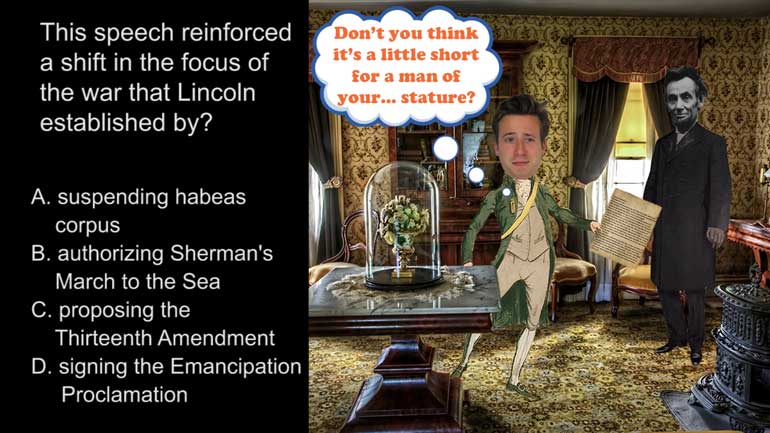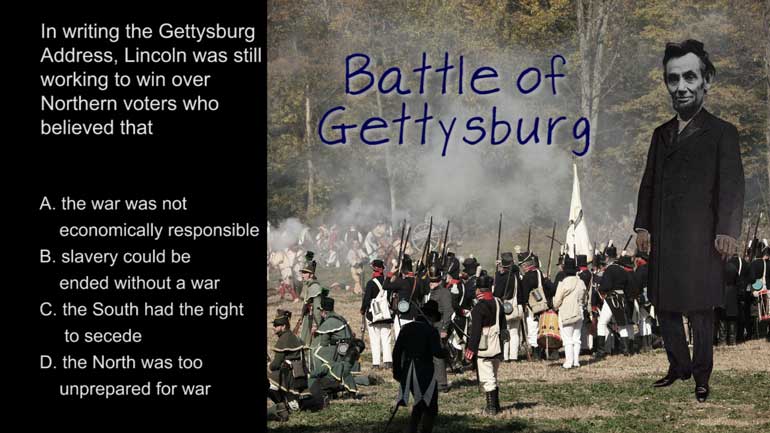ShmoopTube
Where Monty Python meets your 10th grade teacher.
Search Thousands of Shmoop Videos
AP U.S. History 2.5 Period 3: 1754–1800 229 Views
Share It!
Description:
AP U.S. History 2.5 Period 3: 1754–1800. The colonists' arguments for self-government expressed above were most clearly articulated in which of the following?
Transcript
- 00:00
[ musical flourish ]
- 00:03
And here's your Shmoop du jour, brought to you by self-government,
- 00:06
the ultimate one party rule.
- 00:09
Yeah. All right, check out the picture.
- 00:11
The Able Doctor. All this cra--
Full Transcript
- 00:13
Uh, all this fine artwork. Yeah.
- 00:16
All right, the colonists' arguments for self-government
- 00:18
expressed above were most clearly
- 00:20
articulated in which of the following?
- 00:22
And here are your potential answers.
- 00:24
[ mumbles ]
- 00:26
[ mumbling continues ]
- 00:28
All right.
- 00:28
Well what exactly were the colonists' arguments
- 00:31
for self-government?
- 00:32
Well, they didn't like being taxed without having
- 00:34
a voice in government, that's for sure.
- 00:36
And that sword that says "military law" right there?
- 00:39
In the cartoon? That thing?
- 00:41
That probably means they didn't enjoy living under
- 00:43
the constant supervision of British soldiers.
- 00:45
[ groans ]
- 00:46
So let's take a look at the answers and see
- 00:48
which one of these documents most closely
- 00:50
aligns with those ideas.
- 00:52
Were colonists' arguments most clearly articulated
- 00:56
in B - the Royal Proclamation of 1763?
- 00:59
Well, see that word "Royal"?
- 01:01
That should give us a clue that this was issued
- 01:03
by King George III.
- 01:05
In fact, King George signed the Royal Proclamation
- 01:07
to forbid colonists from settling
- 01:09
west of the Appalachian mountains.
- 01:11
And if there's one thing mountain men hate, it's being told what to do.
- 01:14
Also bears.
- 01:16
They hate bears, yeah.
- 01:17
So it's not B.
- 01:18
All right, did the desire for self-government
- 01:21
find a friend in C - Jay's Treaty?
- 01:24
Jay's Treaty was all the way back in 1795,
- 01:28
and it was actually a peace agreement
- 01:30
that averted another war between Great Britain
- 01:32
and the United States.
- 01:33
By that point, Americans were well into their period
- 01:35
of self-government, so that can't be it.
- 01:37
So maybe these concepts were reflected
- 01:39
in D - the Northwest Ordinance.
- 01:41
Well, the Northwest Ordinance was all about
- 01:43
American expansion to the west and creating
- 01:45
new territories for its growing population.
- 01:47
That doesn't sound related to self-government at all.
- 01:50
So eliminate D, as well.
- 01:52
That means the passion for self-government was most reflected
- 01:56
in A - Thomas Paine's Common Sense.
- 01:59
Oh, yeah. On January 10, 1776, Thomas Paine
- 02:02
published this pamphlet anonymously
- 02:04
and it was the best selling book in American history.
- 02:07
Paine argued clearly for American independence,
- 02:10
which helped push the public in favor of revolution.
- 02:12
And George Washington even read the book aloud
- 02:15
to all of his troops. So the correct answer is A.
- 02:18
Guess the British government really should have gotten that
- 02:20
"Paine" in their side checked out.
Up Next
AP U.S. History Exam 2.45. The journey shown on the map was an example of...what?
Related Videos
AP U.S. History Exam 2.26. This speech reinforced a shift in the focus of the war that Lincoln established by...what?
What did the Spanish messengers bring with them to North America? Hint: you probably wouldn't be thrilled to get this for your next birthday.
AP U.S. History Diagnostic 24. How did the United States choose containment over the National Security Council Report in Latin America?
AP U.S. History Exam 2.25. In writing the Gettysburg Address, Lincoln was still working to win over Northern voters who believed that...what?




